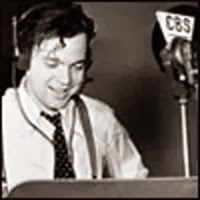-------------------------------------------------------------------------------------------
In RadioLab's very first live hour, they take a deep dive into one of the most controversial moments in broadcasting history: Orson Welles' 1938 radio play about Martians invading New Jersey. "The War of the Worlds" is believed to have fooled over a million people when it originally aired, and it's continued to fool people since--from Santiago, Chile to Buffalo, New York to a particularly disastrous evening in Quito, Ecuador.
-------------------------------------------------------------------------------------------
When Orson Welles decided to make a radio play of the H.G. Well’s classic, "War of the Worlds," he had no idea that he would be branded by the FCC as a "radio terrorist." The audience reaction - panic on a mass level never before witnessed – isn’t just a testament to Welles’ talent for gripping drama, it’s also a reflection of that moment in history. RadioLab takes a close look at the way that the evolving news media collaborated with the events in Europe to prime the pump.
-------------------------------------------------------------------------------------------
RadioLab takes an in depth look at a War of the Worlds radio play incident with even more dire consequences. In 1949, when Radio Quito decided to translate the Orson Welles stunt for an Equadorian audience, no one knew that the result would be a riot that burned down the radio station and killed at least 7 people. Reporter Tony Field takes us to Quito to finds out what really happened. But RadioLab would have hardly have decided to dedicate an hour to this if it was only a two-time occurence. That’s right: it happens again. This time it’s in the 1960s in Buffalo, NY. Why does this keep happening? RadioLab talks to psychology professor Richard Gerrig who tells us that the answer may have to do with RadioLab's natural response to stories.
-------------------------------------------------------------------------------------------
To get some insight into what would make a person want to fool their audience, RadioLab talks to Daniel Myrick. Myrick, with Eduardo Sanchez, made a film called "The Blair Witch Project," which terrified its way to cult success and convinced a few people to never go camping again. RadioLab also talks with Jason Loviglio, a media historian, about how the soothing tone of FDR’s fireside chats, mirrored in the wartime reporting of Edward R. Murrow may have been the true target of Orson Welles’ adaptation of War of the Worlds. And in an ironic twist, the news media fully embraces Orson Welles greatest insight into broadcasting. It’s a truth so terrifying you won’t want to miss it: if the audience is scared, they will keep listening.
-------------------------------------------------------------------------------------------





No comments:
Post a Comment